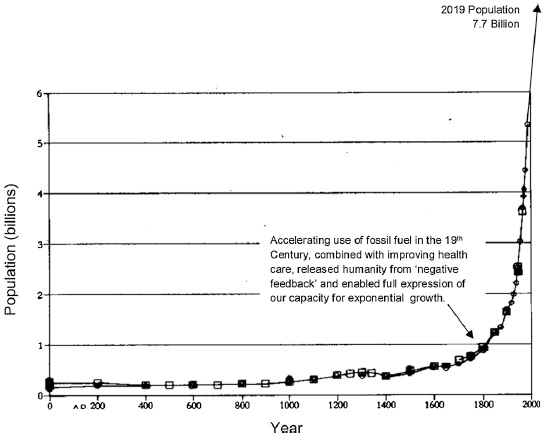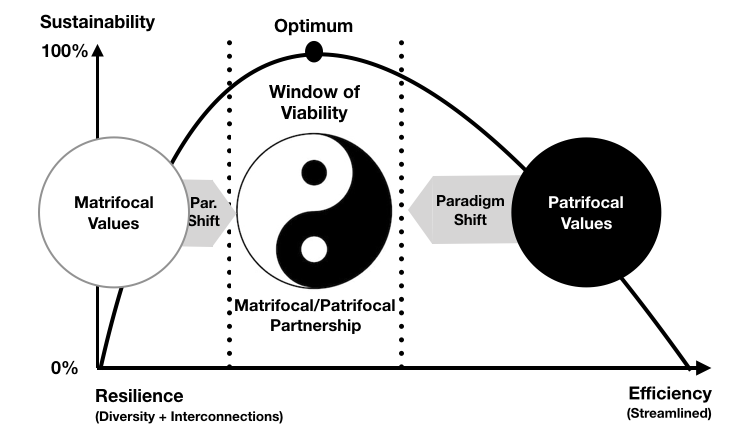Laudato Si' (Praise Be to You!) is the title of an encyclical published by Pope Francis in 2015 about "care for our common home." This page is an analysis of the document, the reasons why it has been mostly ignored, and the reform that the Catholic Church must undertake if the encyclical is to become more appealing and more credible as moral guidance for the future while the ecological crisis unfolds. It is argued that, while this papal teaching is very timely and mostly persuasive, it attempts the impossible task of reforming a patriarchal world without renouncing patriarchy, and the church must lead by example in order for people to pay attention, face reality, and experience "ecological conversion."
The COVID-19 pandemic is not the first signal that Mother Nature is becoming increasingly irritated with the manner and intensity of human activity. For anyone willing to see, many other noisy signals have been in evidence for decades: pollution accumulation, biodiversity decimation, food and water contamination by industrial effluents, climate change, etc. What is the root cause of this increasingly nefarious process of ecological degradation?
The root cause is also well known, although it is politically incorrect to mention it. It is the globalized confluence of three tsunamis activated by humans and directed by humans: over-population, over-consumption, and over-invasion. Humans are reproducing like rabbits, consuming like dinosaurs, and forcefully invading every corner of the planet by using the enormous power of fossil fuels. In a recent article, The Earth Is Telling Us We Must Rethink Our Growth Society, Bill Rees provides a good synopsis of the situation and a reasonable prognosis for the future of human civilization. Readers who want to review the empirical evidence, and are willing to face reality in excruciating detail, are cordially invited to study this longer piece: Ecological Economics for Humanity's Plague Phase.
Laudato Si' is a reflection on this reality from the perspective of Catholic social doctrine. It addresses the three tsunamis mentioned above, and provides moral guidance accordingly. It is, without a doubt, the best moral guidance available for all men and women of good will. But something is missing. Underlying the three tsunamis is the pervasive culture of patriarchal domination by brute force that has prevailed since time immemorial. The encyclical does mention the need for a "bold cultural revolution" (#114) but there is no mention of the mutually reinforcing effect between secular patriarchy and religious patriarchy. This is understandable, given that the Catholic Church, for historical reasons, has been and still is a patriarchal institution; but it is also lamentable because, with an estimated 80% of the world population adhering to a religious tradition, it is hard to imagine overcoming the patriarchal syndrome in social and economic affairs as long as religious institutions remain patriarchal.
In this regard, sections 50 and 155 of the encyclical deserve careful analysis. Section 50 touches on the population growth issue by stating that there is an "unequal distribution of the population." But then states that "demographic growth is fully compatible with an integral and shared development." So increasing birth rates is good even if death rates increase as a result due to
congestion and poverty fermenting viral pandemics like COVID-19? The section concludes: "Still, attention needs to be paid to imbalances in population density, on both national and global levels, since a rise in consumption would lead to complex regional situations, as a result of the interplay between problems linked to environmental pollution, transport, waste treatment, loss of resources and quality of life." Indeed, but it is hard to see how the concept of responsible parenthood can be reconciled with disordered patriarchal desires (Genesis 3:16) that, exacerbated by cheap surplus energy, have driven population growth to 7.7 billion people — and counting.

Source: Ecological Economics for Humanity's Plague Phase,
William E. Rees, Ecological Economics, March 2020.
The patriarchal ghost hiding behind Catholic social doctrine becomes more discernible in section 155, where the point of reference for human ecology is a patriarchal theology that reduces personal subjects to sexual objects, male or female. There is no reference to humanity being created male and female, as in the Book of Genesis (1:27, 2:23, 5:2). There is no reference to a more adequate Theology of the Body that recognizes the common humanity of man and woman, whereby their relational complementarity abides in consubstantial unity. There is no Yin and Yang, and there is no Yin in Yang, and Yang in Yin, as in Daoist philosophy. There is no animus and anima, and there is no anima in man and animus in woman, as in modern psychology. There is no balancing of the masculine and feminine polarities that are essential for natural human relations, and for natural relations between humans and "our common home." This even though there is modeling, supported by empirical evidence, that such balancing is crucial for the health of natural ecological systems. Such natural balancing of male and female polarities is also crucial for the health of social systems, as has been postulated by Bernard Lietaer:

Balancing matrifocal and patrifocal values is essential for sustainability.
Source: Bernard Lietaer et al, Towards a Sustainable World, 2019
The exact location of the optimal balance may be different for different systems, but the shape of the curve is the same for all systems, and a balance of resilience (matrifocial) and efficiency (patrifocal) is a requirement for the sustainability of all systems. No wonder that matriarchal societies languished long ago, and no wonder that patriarchal societies are now languishing as industrial efficiency becomes increasingly unable to deal with more disorder (entropy!), more pollution, more income inequality, more violence, more local wars, more international tensions, more migration, more infestations, and more of everything, even with technologies powered by massive inputs of nonrenewable energy.
On this fifth anniversary of Laudato Si', some questions come to mind. Sections 50 and 155 are not unrelated. Section 50 states that "demographic growth is fully compatible with an integral and shared development." So, human activity is causing the ecological crisis, but population growth is not a problem? Section 155 states that "it is not a healthy attitude which would seek to cancel out sexual difference because it no longer knows how to confront it." So, man and woman are both fully human, but their sexual difference makes them unequally human when it comes to social and religious affairs? Something smells. What is the ideological common denominator of these two sections?
Could they be rationalizations to justify the patriarchal ideology of male headship?
Could they be rationalizations of centuries fostering large patriarchal families?
Could they be rationalizations of "God the Father," a term that comes from patriarchal Greco-Roman culture (cf. Catechism of the Catholic Church, sections 239, 370, 2779)?
Could they be rationalizations of the masculinity of Jesus falsely assumed to be essential for the redemption?
Could they be rationalizations of the masculinity of the twelve apostles falsely assumed to be essential for apostolic succession?
Could they be rationalizations of phallocentric rituals that exclude women from ordination to the priesthood?
The need for balancing maternal and paternal self-organizing applies to both secular and religious institutions. In the Catholic Church, the Virgin Mary has provided the matrifocal value for 2000 years. It is time for other qualified women, ordained to act in persona Christ, to help in providing maternal care for the faithful and teaching maternal "care for our common home" in a more tangible form, in the flesh (Cf. John 1:14). Who says that a woman cannot naturally represent the Word made flesh? There is one human nature, male and female. The male/female duality of human nature is one of relational complementarity in consubstantial unity, not one of mutual exclusion as prescribed by patriarchal gender stereotypes. As long as the headship of the Catholic Church and other religious institutions remain exclusively patrifocal, they are part of the problem, not part of the solution.
For the wise moral guidance of Laudato Si' to become more credible and more appealing, the Catholic Church must cease to be a patriarchal institution. The Catholic Church must become what she wants the world to be. After 10000+ years of patriarchal civilization, it is ludicrous to propose reforming patriarchy while remaining patriarchal. The Christian faith is not intrinsically patriarchal, so there is no dogmatic impediment. When we have women bishops in the Catholic Church, and there is matrifocal/patrifocal balance in the headship of the Body of Christ on earth, the light of
Laudato Si' will shine more clearly, and a critical mass of people will embrace "good living" in harmony with the human habitat. Then, and only then, can we reasonably expect the planet of the humans to become a common home where "ecological conversion" happens.

An adequate anthropology of gender balance is essential to renew the community of creation.
Image: One Sacred Community ~ Art by Mary Southard, CSJ ~ Ministry of the Arts